Friendship is a common belief in the same fallacies, mountebanks and hobgoblins, said a wise man once. For me, it is a tangible thing: alive and concrete, offering supports that sometimes even love has failed to provide. Could be that it weighs more merely because where love has sometimes been blind, friendship has chosen to close its eyes! Uncommon as true love is, it is clear that true friendship is even rarer.

This mention of friendship comes to mind because I am reminded of my recent visit to Sunni to catch up with my friend R. R, in turn, reminds me of those lines by Maria Wentworth: "Good to the poor, to kindred dear / To servants kind, to friendship clear / To nothing but her self severe.." By association of thoughts, I leap from musings on friendship to thoughts of R and from there to images of Sunni, the little town where she lives.
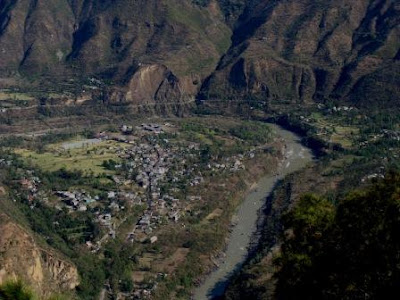
Sunni is a little
taluka place about 45 kilometres from
Shimla. Plenty of people visit
Tattapani, but few seem to stop at Sunni which is home to a lovely architectural gem, home to R, her husband M, their cute little puppy, Naughty and her venerable father-in-law, the old
Tikka-
saheb.
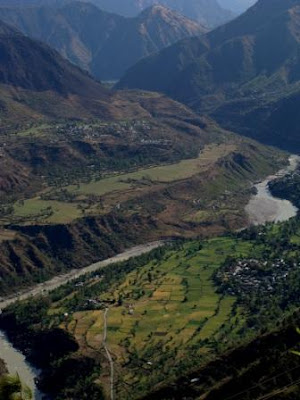
The drive from
Shimla winds past
Mashobra,
Baldian,
Badmain and
Basantpur. A river runs through it all. Now you see it. Now you don't. Mountains form boundaries of sorts. In big-brotherly fashion,
Shali, the tallest of them all, towers above the rest. The road which once tried your nerves as well your bones is today almost as smooth as
Hema Malini's botoxed cheeks.
Take the hairpin bend where the road says
Basantpur/
Tattapani, and you're on your way to Sunni. The first thing you notice is the perceptibly higher temperature. R & M like to frighten potential visitors by talking of the horrendous temperatures. For sure, Sunni is not
Shimla. (And thank God for that!). It is warmer than
Shimla, but not as warm as, say, Delhi, or Agra!

A walk around the town reveals a multitude of temples, almost an embarrassment of
religious riches, so to speak! The visitor sees
godmen of various hues and persuasions. One or two look quite dubious, given to the ways, alike, of man and mammon.
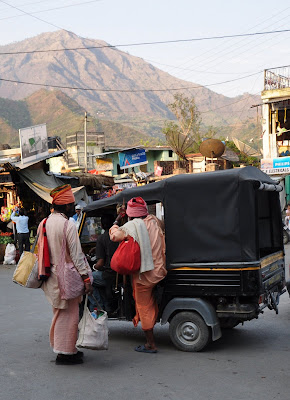
Turn another hairpin bend. Puff your way up a little slope. If you stop to wipe your brow and happen to look up, you may see this little "palace". The residents shrug in acceptance of breathless praise. Perhaps, for them familiarity has bred contempt. But to the first-t
ime visitor, the
Bhajji palace is a breath-taking sight. On an empty stomach, it has reminded me of rich, scrumptious black forest pastry! But on a serious note, I drink every quaint little detail and never tire of this droll building which, though well-embellished, is not so rococo as to sate the eye.

I lack the knowledge to comment in an informed fashion about the architectural details of the palace. Suffice it to say that I find its combination of mud, plaster and wood ideal for the local weather.

It is also home to fanciful things, here a little window with swans and lemon fruit, there a spiralling stairway that looks like a sea-shell cut in half.

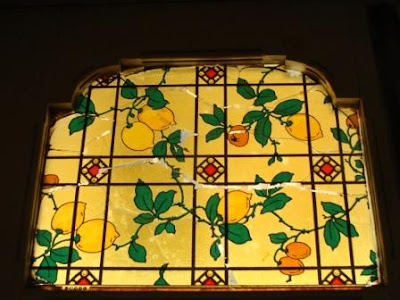
The wood has aged well: you see a range of colours: terracotta, russet, tawny, auburn, chestnut, hazel, fawn and puce.
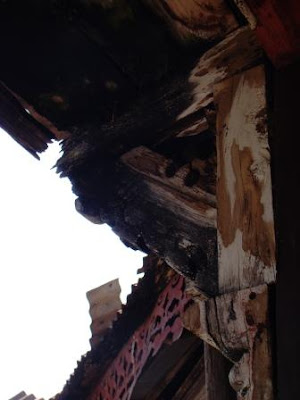

Simplicity, as seen in the Sunni palace, has in its foundation a sort of modest refinement rarely seen in large houses these days.
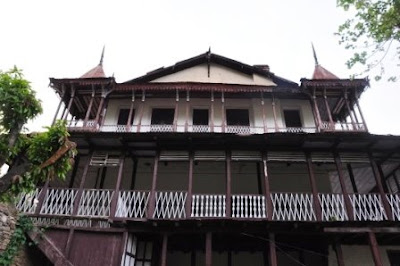

This little manor is majestic without severity, impressive without being showy, emphatic in its admonitions and grand in its sheer simplicity. All is measured, mingled and varied, abundant of meaning, should you choose to seek it.








